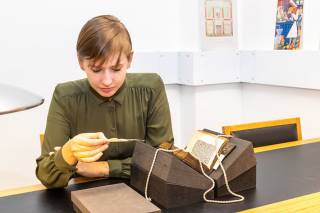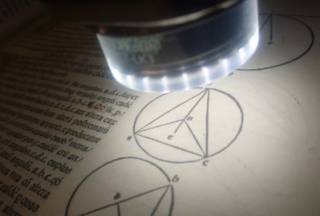UCL Special Collections supports academic teaching and research in a wide range of subject areas across our Bloomsbury and East (Stratford) campuses.

Whether you are studying, teaching or researching, we can work with you to make the most of our collections. You can use them to enrich your learning and coursework, as inspiration for developing research projects, or as a rich source for ground-breaking publications and new ideas.
If you are new to using rare books, archives and records for university learning and research, we can help - just get in touch to find out how.
- Research
We work with researchers from UCL and beyond to develop and support research projects based on our collections.
Projects we have been involved in range from the ESRC-funded ‘Discourses of Voluntary Action at two 'Transformational Moments' of the Welfare State, the 1940s and 2010s’ to digital imaging projects in collaboration with the UCL Centre for Digital Humanities and the UCL Leverhulme-funded project ‘Bloomsbury and Reform in the Nineteenth Century’.
We also run an annual Visiting Research Fellowship scheme.
To discuss potential research projects using our collections, including support for funding bids and grant applications, please email UCL Special Collections.
For guidelines on how to reference items from UCL Special Collections in your publications, please see our citation guidelines.
- Teaching
Our academic teaching programme reaches over 1,000 university students in over 50 classes each year. We offer teaching and support for students (primarily at UCL) of taught courses, research students and teaching staff.
We offer:
- Single classes within a taught module
- Whole taught modules when sufficient resources are available
- Development of new modules that use our collections
- Training in archival and bibliographical research skills
- Face-to-face and online classes and a range of digital resources
We can work with you to select suitable items, prepare and deliver classes. To speak to someone about developing a new session, please contact the Academic Support Team. Please note that we require at least one month's notice for teaching requests.
- Student Projects and Connected Curriculum
Special Collections actively supports research-based learning for students on taught courses at UCL, following UCL’s innovative Connected Curriculum. Examples of this work include:
- Planning online exhibitions (Arts and Sciences BASc degree)
- Transcribing manuscripts (Medieval & Renaissance Studies MA)
- Translating archive documents (Languages BA)
- Preparing modern editions (Publishing MA)
- Presenting at public events (Fine Art BA)
We can work with module leaders to help identify suitable material, develop project ideas, provide training in using the collections, and timetable staff availability.
Please contact the Academic Support Team to discuss your ideas.
- Academic and Public Events
We support and run a busy programme of academic and public events, both face-to-face and online. Our visualisers enable us to show collection items live online: see our YouTube channel for examples. To discuss how we can support your conference or event, or discuss presenting at our events, please contact the Academic Support Team.
Learn more about UCL Special Collections' programme of events and exhibitions.
- Diversity and Inclusion
- We are committed to diversity and inclusivity in our research, teaching, and project activities. Although we acknowledge that our collections reflect the interests and concerns of the benefactors who donated them to UCL, we aim to include the experiences of people of diverse backgrounds in the material we select for educational and promotional purposes, and to address themes relating to underrepresented groups in our teaching and public programming. We are committed to making our activities as inclusive as possible to ensure everyone can use our collections; groups and individuals do not need prior experience of engaging with historic material. We gladly tailor our sessions to the learning requirements of participants and continually review our offering to ensure it is accessible to all.
 Close
Close

